The Homelessness Crisis Is a Crisis of Democracy
Homelessness is often thought of either as an issue of individual moral failings or merely of bad policy. It should instead be seen as a moral crisis for our democracy, one that demands transformative economic reforms.
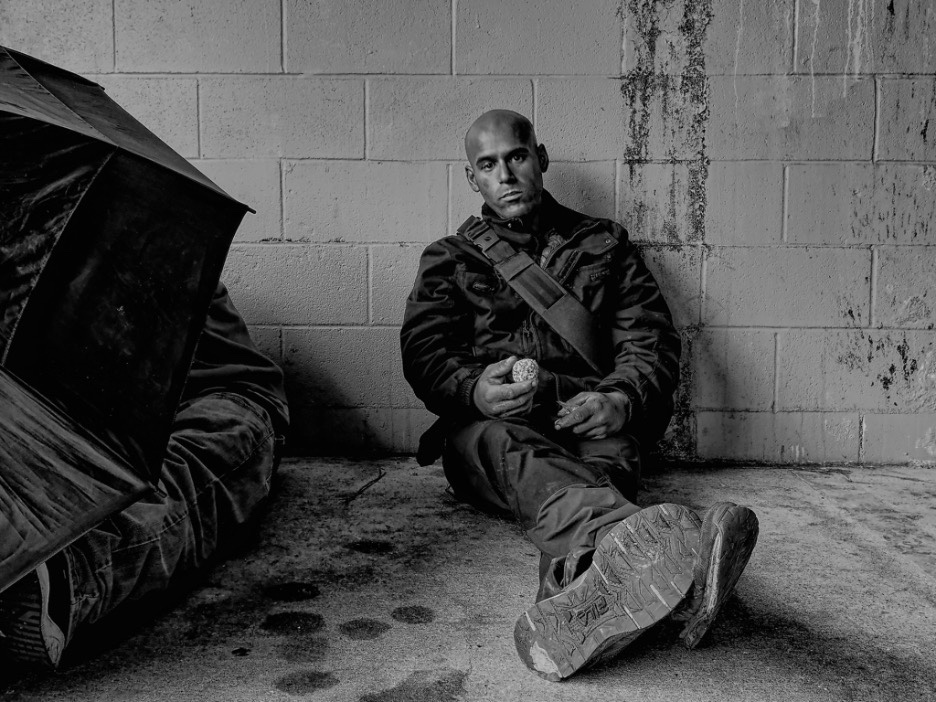
Trey, homeless in Olympia, Washington, sits in a parking garage. (Courtesy of J. M. Simpson)
For the past several months, a homeless man named Joshua has taken up residence in a dank crawl space beneath a crumbling building, situated at the end of an old train tunnel. The ceiling is low, making it impossible to stand, and there are rats crawling everywhere. “I hate them,” Joshua complains. “I try to kill them, but it just attracts more.” He pauses for a second. “Rats eat dead rats, you know?”
We’re in Olympia, a half mile from Washington state’s capitol. The city, Joshua tells me, has been raising fences and blocking alleyways in order to redirect the “undesirables,” while police usher away those resting on sidewalks during daylight hours. If he’s out in the open, he feels like he’s somewhere he’s not supposed to be — even in places where there’s a visible homeless population. But beneath the building, alone with the rats, no one bothers him, and he bothers no one.
Much of what’s written for liberal audiences about homelessness aims, first and foremost, to inspire empathy — it encourages compassion toward a population that spends much of its time feeling cold, wet, scared, and miserable. Complementing this sort of reporting are wonky social-scientific analyses intended to identify homelessness’s root causes — in most cases, blaming housing costs or zoning ordinances or various failed public policies. Taken together, these two genres might be understood as intending, reasonably enough, to inspire action by arousing sympathy for this materially dispossessed population while also explaining how to fix the problem.
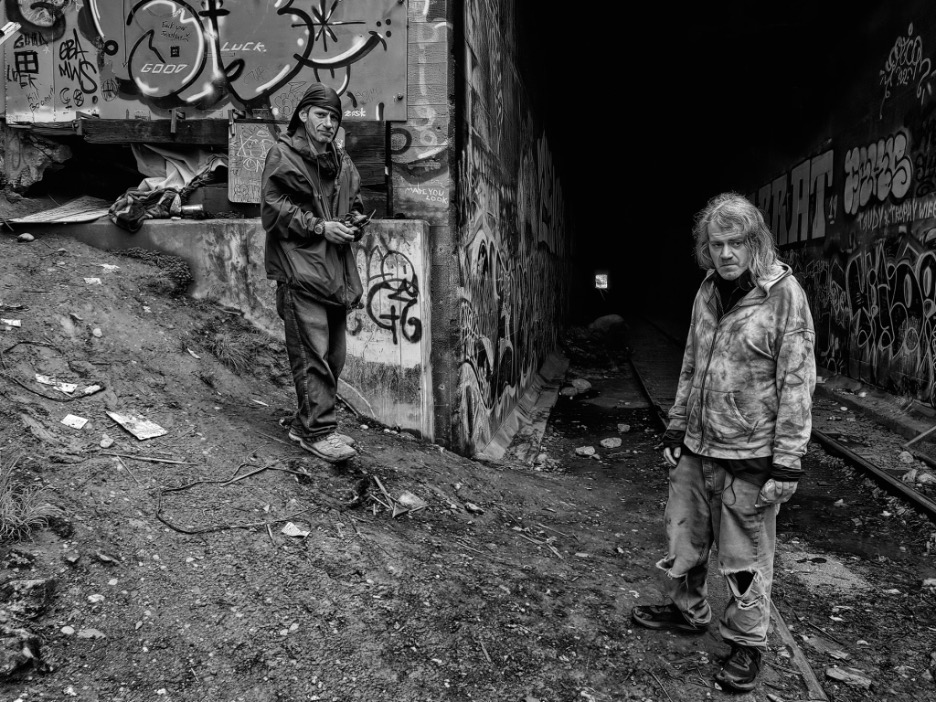
The Right, on the other hand, has tended to offer sweeping moral narratives about homelessness and its societal effects. Christopher Rufo, for instance, got his start writing about homelessness as a kind of moral disaster. On his telling, homelessness in America is a story of drug addicts, the mentally ill, and criminals who are transforming cities into places where responsible, law-abiding citizens can no longer live peaceful, comfortable lives. Liberals, he argues, have enabled bad behavior with their permissiveness, while left-leaning nonprofits rake in donations and government funds as the problem only seems to get worse. The story is one of moral rot at every turn.
The Right seems to be winning the public-opinion battle over homelessness, and their willingness to offer a dramatic moral story has a lot to do with it. It is understandable that, when people step outside their homes to see bodies strewn about the sidewalks, discarded syringes, vandalized property, and street dwellers shouting at innocent passersby, they would begin to sideline their empathetic impulses and wonder about the collective failure that led to this. And if reactionaries are the only ones offering a clear moral narrative, it should surprise no one when public opinion begins drifting rightward.
There exists, however, a compelling counternarrative — one that goes beyond mere appeals to compassion or calls to relieve suffering and speaks to the sense of moral scandal that mass homelessness can inspire. This narrative sees the man holed up in a rat-infested crawl space as symptomatic of a degenerating, decomposing democracy. What I have in mind isn’t a story about electoral politics, but the more fundamental idea of democracy as a shared way of life characterized by equal standing, civic participation, and community.
In recent years, the population of chronically homeless individuals in the United States has ballooned to over 140,000 people — enough to pack Madison Square Garden seven times. To have an entire class of human beings who bear none of the markings of full citizenship — who are able neither to take on the responsibilities essential to membership in a democratic society nor to claim many of its core benefits — makes a mockery of our commitment to these values.
In a country with a significant history of dehumanization and exclusion of various disfavored groups, but which often celebrates its attempts to overcome and transcend such injustices, a moral narrative that emphasizes this point has enormous potential to win people over to a progressive response to the homelessness crisis.
Internal Exile
“If they can tell us we’re not allowed outside, then where are we all supposed to go?” Frankie asked, in a tone that wasn’t so much contemplative as accusatory. I’d been told that Frankie would have thoughtful insights about life on the streets of Olympia, and it took him no more than twenty seconds to start in on Grants Pass v. Johnson, the Supreme Court decision from 2024 allowing cities to arrest homeless people for sleeping outdoors.
It was this attack on his rights, rather than his lack of dry socks or inability to enjoy a warm meal, that he chose to emphasize. For someone struggling just to meet the needs at the base of Maslow’s hierarchy, the concerns he articulated surprised me: they were less about physical suffering and more philosophical in nature. When the homeless are banned from sleeping outdoors even when, as is often the case, there are no beds at the shelters, it calls into doubt their very status as citizens — and as persons with a right to exist.
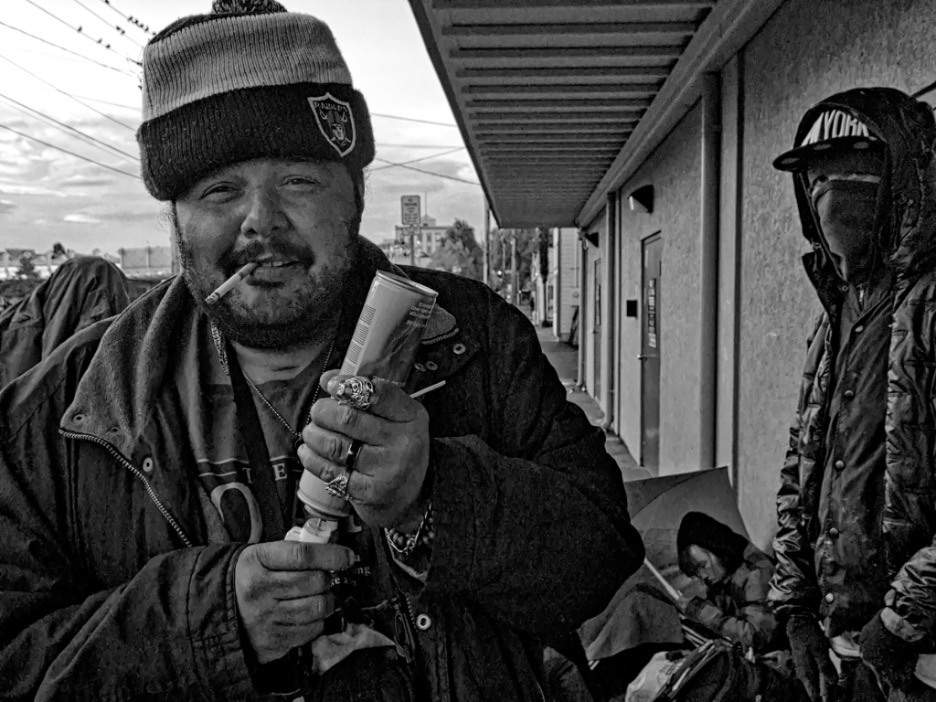
Frankie was no outlier. Again and again, when I asked homeless people about their experience, they talked more about their exclusion from society than about their physical needs. An older, silver-haired woman named Diane spoke calmly to me about her boyfriend, who she said looked out for her, and about her relationship with God, who she said listened to her prayers. But aside from them, no one else seemed to listen to her or take her concerns seriously. This was her primary complaint, as she went on to tell me a story about a time she finally got an apartment, only to have some unwelcoming tenants falsely accuse her of making a commotion, leading to her eviction.
Although I had no way of verifying this narrative, Diane’s complaints about the eviction process echo those of many others. Her side of the story wasn’t taken seriously by the landlord or by anyone else, she felt. She said she didn’t know how to appeal her case or where to go to find legal aid. Identifying a procedural path to get her side of the story heard seemed impossible.
When most of us speak, we are seen as real people with real concerns. But for people like Diane, their words often aren’t legible: everyone, from passersby to the legal system to elected officials, register them as beings whose status is ambiguous and whose standing as persons needn’t be fully recognized.
Once you notice it, the phenomenon appears everywhere. Business owners make a complaint about loiterers in storefronts, and the police typically address it. Homeowners see a tent go up on the sidewalk and make a “quality of life” call to the police, who respond promptly and affably more times than not (and if they don’t, a city council member will). But those I talked to insisted that the police aren’t so responsive when it is a homeless person who needs help, even though they’re more likely to be victims of crimes than they are perpetrators of them.
For instance, two men told me in a matter-of-fact manner that when troublemakers drove through their neighborhood pelting them with eggs, they didn’t even bother approaching the cops. (“The police have better things to worry about.”) Same when there is a fight and the participants are unhoused, to say nothing of an instance of theft. While most said that the police on the whole treated them decently, they also understood the cops’ primary purpose to be serving businesses and homeowners — and what businesses and homeowners want is usually for the homeless to be managed, supervised, corralled, or removed.
Homeless people thus find themselves in what we might call a state of internal exile — cast out of, and excluded from, the society in which they physically remain. The laws, institutions, and social practices that constitute us as a demos, or a people, work in concert to nudge those without housing into the metaphorical margins.
And sometimes, the not-so-metaphorical margins. The Jungle is a six-acre wooded area on the edge of Olympia, occupied by several dozen homeless residents. Muddy and strewn with garbage, the area is lawless, unpoliced, and dangerous. Its denizens’ reviews of the place are decidedly mixed. More than one emphasized the freedom it afforded them, which they associated with everything from the ability to sleep without being told to move to the ability to smoke meth without causing a scandal. But they also mentioned rumors that they would eventually be thrown out, forced with little notice back into places where they’re not welcome.
Of course, there are reasons why the world is reluctant to embrace them. In the fall, two residents of the Jungle set a third on fire, burning him to death; another was murdered with a bat. To avoid having violence like this visited upon them, homeless individuals often have to develop a violent disposition themselves (or retain and deepen the one they already have).
Residents take drugs because they are bored but also because they are afraid to go to sleep at night, because they can’t emotionally cope with their situation, or because it warms them when it’s cold. Whatever led these people to homelessness in the first place the necessities for survival leave them ill-suited for polite society. Banish a person to the Jungle, and banished they are likely to remain.
Even efforts to materially aid the homeless population often have the effect of exiling them further. When Olympia decided to house 150 people who’d been camping on the side of the freeway, they moved them into a refurbished Days Inn. The rooms were clean, warm, and dry, and one of the residents told me that the place was “a godsend.” But it was also noted by almost everyone I talked to that the building was in the next town over, fenced in, and had the air of a “homeless ghetto.”
Fewer rats than in Joshua’s crawl space — but “bother nobody, nobody bothers you” remained the rule.
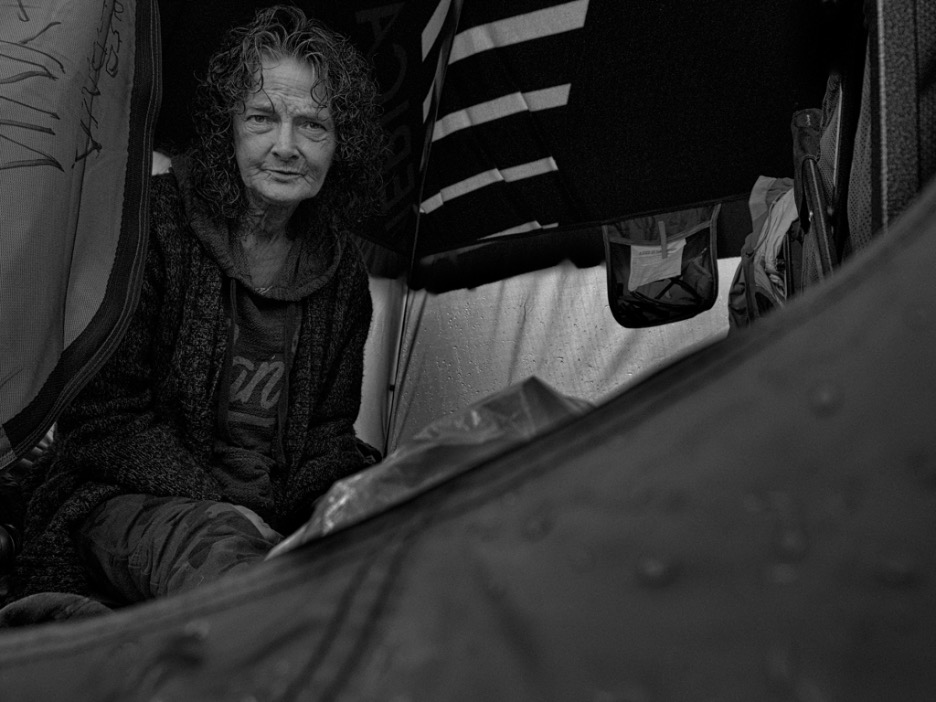
A Crisis of Democracy
Critical of what he sees as the liberal technocrats’ refusal to acknowledge the reality staring them in the face, Rufo calls for us all to “address the clear evidence that homelessness is the endpoint of a deeper anomie, the generalized breakdown of the social order that can be reversed only through profound cultural reform.”
Drawing on “Slouching Towards Bethlehem,” Joan Didion’s famous essay about the excesses of 1960s counterculture — including a famous vignette in which hippie parents drop acid with their five-year-old — he concludes that “the only way forward . . . is to recognize that society must reestablish a sense of restraint.” But the internal exile idea can, I believe, serve as a counterpoint to, or a rival of, Rufo’s Didion-inspired story, and it points to the conclusion that a positive liberatory program rather than a reactionary crackdown is the way to address the crisis of homelessness.
The philosopher John Dewey understood a commitment to democracy as requiring a particular outlook, or ethos — one that presumably should inform our reaction to seeing those without housing pushed to the margins of social life. This outlook is characterized, first and foremost, by “a generous belief in [each individual’s] possibilities as human beings, a belief which brings with it the need for providing conditions which will enable these capacities to reach fulfillment.” It’s an ideal that an individual person might violate on a particular occasion. But it’s also an ideal that we can collectively fail to live up to perpetually.
This, I think, is what explains the sense that the homelessness crisis is about a deep moral rot that extends beyond the deprivation of those who suffer from it. A society where an entire class of people is excluded from the institutions, practices, and resources that unlock human possibility not only wrongs morally those who are excluded but degrades all of us who aspire to live as a democratic people.
Consider by way of analogy a point Frederick Douglass made repeatedly about slavery’s effects on the whole of society. Masters and slaveowners, he thought, were among the institutions’ victims. “A man’s character greatly takes the hue and shape from the form and color of things about him,” he wrote. A slave society turns what could have been a decent person into someone who is “literally insensitive to the claims of humanity.” It does this, he thought, by placing some human beings who live among us outside our circle of recognition and care.
The analogy between homelessness and slavery should not be overplayed, as the injustice of the two differ in degree and kind. But it is still instructive. To live in a society that chases people away under buildings as if they were rats, tells them they can’t sleep outside even when they have nowhere to go, shrugs when they’re pelted with eggs, and moves them outside city limits to avoid having to deal with them, is to live in a society that similarly encourages insensitivity to the claims of humanity.
No matter how liberal they are, residents of large cities are now forced to ignore pleas from people sitting on the sidewalks if they’re to make it to work on time. Otherwise empathetic business owners have to evict homeless people from their property in order to keep their customers. Employers with no animosity toward the unhoused are compelled to treat their homelessness as disqualifying, as they can’t afford to hire someone who might not be able to arrive to work showered and fully awake.
Of course, the case I’m making here is most compelling when we think of those who fall into homelessness through no fault of their own — the gay teenager thrown out by their bigoted parents, or the working-class parents who lose their jobs and are unable to afford the rent. There are, however, plenty among the homeless population who ended up where they are through poor choices. But despite what some on the Right would insist, such examples don’t speak in favor of a punitive approach to homelessness.
After all, the mistakes that sometimes lead people to become homeless are rarely malicious, and they are rarely grave wrongs. They involve mundane failures to save, abuse of substances, cultivating antagonistic relationships with others, and so on. To exclude tens of thousands of people from participation in society, in the way we do when we countenance homelessness, is to impose a penalty completely disproportionate to any of these offenses, while walling off avenues for rehabilitation. Furthermore, it means using someone’s mistakes as a pretext for turning away from their humanity — an attitude wholly inconsistent with the belief in the capacities of all people that Deweyan democracy demands.
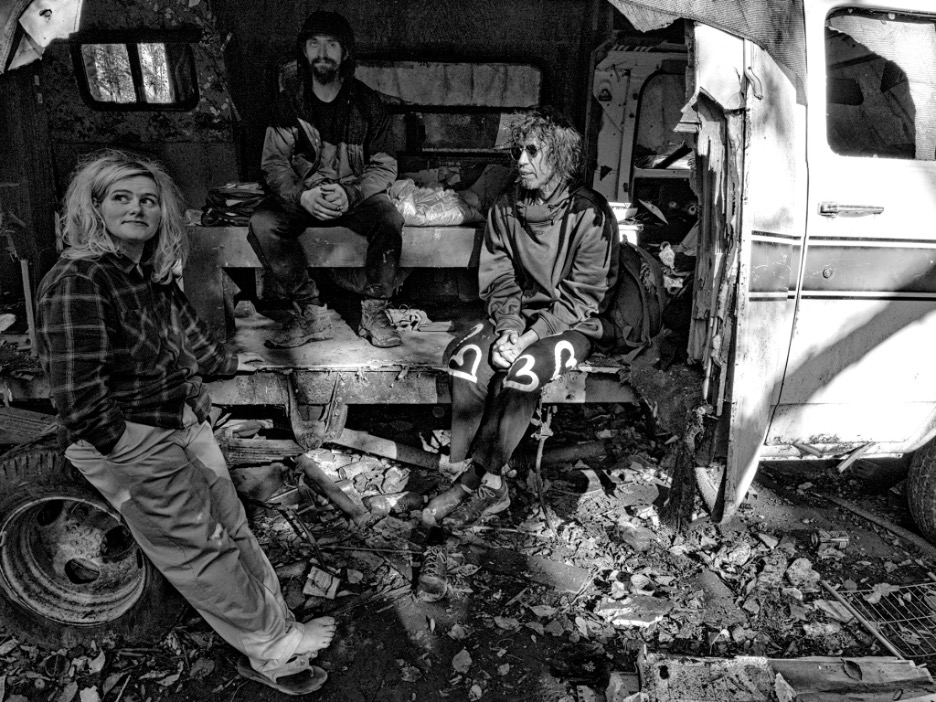
A Way Forward
In his 1962 speech “The Ethical Demands for Integration,” Martin Luther King Jr argued that ending legal segregation was too modest a goal for a country aspiring to true democracy. He believed this because the end of formal discrimination is still compatible with a nation “where men are physically desegregated and spiritually segregated, where elbows are together and hearts are apart.” Mutual recognition and belonging are not achieved merely by allowing everyone to sit at the lunch counter.
Nor will it be achieved merely by allowing the homeless to sleep in the park.
At a moment when homeless people’s right to share our public space at all seems in doubt, talking about the need for more thoroughgoing integration might seem extravagant. At the same time, if we focus only on formal barriers to inclusion, we risk a bleak future in which we recognize a person’s right to sleep on the sidewalk while we step over them and look away. King’s message was to never lose sight of the democratic ideal. But what does it look like to keep the ideal in view?
When the topic is homelessness, often the hope is for a silver bullet — a straightforward policy or two that can be implemented quickly, that will yield immediate results, and that will cost us little. But fortifying democracy has never been so simple as implementing a few good laws or abolishing a few bad ones. The civil rights movement required federal oversight of state elections, forced integration of schools, and a decades-long war on housing discrimination. Addressing homelessness will similarly require radical, far-reaching reforms.
While rethinking zoning laws and funding more housing vouchers is good, it’s also insufficient. Reintegrating the homeless population and preventing others from becoming homeless in the future might require that public land be acquired for residential living, and that massive amounts of housing construction be funded by the state.
It will require fundamental shifts in the way we approach addiction and mental illness, as neither the prevailing punitive approach nor the alternative libertarian view that aims always for minimal coercion is likely to achieve integration. It would require not just that we get roofs over people’s heads but that we take positive steps to provide them with job training, education, and opportunities to live and commune with others.
These sorts of reforms are most likely to win wide support if they are part of a broader program aimed at promoting economic security and raising living standards for the working class, including measures like a basic income, empowerment of unions, expansion of Medicare and Medicaid, and a federal jobs guarantee. A universalistic approach speaks to the fact that homelessness affects all of us — both because it is a fate that can befall any working-class person, and because it erodes the ethos of mutual respect that a democratic society requires.
While in Olympia, I visited Quixote Village — a small community run by a nonprofit on land set aside by the county, consisting of thirty tiny homes and a large communal building with a kitchen and laundry room. The residents, who had all at one point been homeless, are given access to social workers who help them with employment, financial and medical plans, but also work on getting them to adhere to community guidelines and rules.
The employees I talked to were clear-eyed about the challenges they faced in undertaking this work. Residents sometimes come in knowing little about how to live around others, and once they do learn, they make mistakes and slip up. And the whole enterprise was resource-intensive — not cheap.
At the same time, I could see the vision. With the village as a home base, the residents were able to start to reintegrate into society — undergoing job training, working, and volunteering. Dewey argued that democracy cannot be realized without active, positive efforts to bring about and sustain it (which is why he advocated, famously and forcefully, for universal public education).
A similar approach is needed as we confront homelessness. Not simple technocratic fixes, like some centrists seem to hope for; and not a push toward increased restraint and punishment, like many on the Right want. What’s needed is a broad, sustained transformational effort designed to bring those pushed to the margins back into the fold and to prevent people from being pushed out in the first place. What’s needed is a politics that is focused not just on keeping people alive, but on enabling everyone to flourish as the social beings they are.